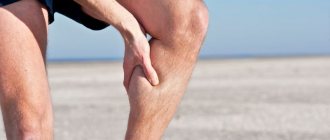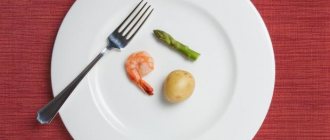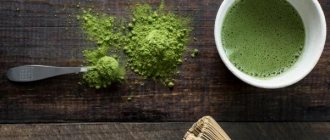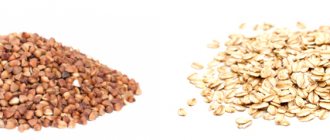Published 09/17/2020 · Comments: · Reading time: 12 min · Views: Post Views: 5,031
Welcome to the article based on the lecture on controlling appetite and physiological hunger. The mentioned lecture was recorded jointly with Galina Lebedeva. She kindly shared her experience gained while studying the stories of ordinary people who could not get their appetite and hunger under control and continued to overeat! The lecture and this article detail the 15 best, proven tips and methods to help you understand why uncontrollable hunger and increased appetite occur, causing you to overeat. This is the result of close observation of the lives of ordinary people, and not just metaphysical theorizing. Please use the information received immediately to feel the effect for yourself. In my humble opinion, this information is even too much for the average person! Galina’s speech on the topic “How to control increased appetite and not overeat to lose weight” is embedded in the article below:
Eat more protein or fat
Not all foods satisfy hunger equally. Eating protein and fatty foods can reduce hunger. Research shows that protein and fat are essential to satisfy hunger and help you feel full longer.
Recommended protein-rich foods
- lean meat;
- eggs;
- beans and peas;
- nuts;
- soy products;
- yogurt.
Foods that are sources of fat:
- nuts;
- seeds;
- avocado;
- olive oil;
- cheese;
- coconut;
- eggs.
Appetite and hunger: what's the difference?
The ever-growing number of overweight people is the result of poor nutrition. Or rather, the wrong attitude towards food. And to be completely precise - constant overeating. Today, for every one hungry person, there are ninety-nine gluttons. This means those suffering from excess weight and a whole bunch of diseases that are associated with it. The main problem is that people have ceased to separate two concepts: appetite and hunger, while hunger is a need, and appetite is a desire.
What is hunger?
Hunger is a signal from the body that energy is running out and it’s time to recharge with nutrients (a sudden desire to eat is associated with a sharp drop in blood glucose levels). Physiological hunger manifests itself differently in different people. But the most common symptoms are weakness (loss of energy, mild headache), special sensations in the mouth and stomach.
In order to remember your own feelings of hunger, it is enough not to eat anything for four hours.
What is appetite?
Appetite is our desires, our passions, our taste habits. Sometimes something looks and smells so appetizing that we are ready to eat and eat, although not only are we not hungry, but we even feel that we have been too full for a long time. Appetite, like any desire, is extremely difficult to satisfy: we satisfy one desire, another arises, even greater than the previous one. In addition, appetite occurs much more often than hunger, and if there is a habit of constantly satisfying one’s appetite, then a person is constantly overeating. Thus, appetite has nothing to do with the actual need for food. Often we look at food only as a source of pleasure, trying to compensate for our personal adversities and relieve stress with its help. The price of such a discharge is excess weight and all the problems associated with it.
How to learn to distinguish between appetite and hunger?
Distinguishing hunger from appetite is not difficult. If a hungry person is asked if he wants to eat, he, without hesitation, answers: “Yes!”, and a not hungry person usually clarifies: “It depends.” At the physiological level, hunger can be distinguished from appetite as follows: everything that is localized above the diaphragm - emotional experiences, thoughts that it is time to eat, “memories” of taste buds - is appetite, and what is below is sensations in the stomach, weakness in the legs, sexual indifference, is hunger.
Learning to differentiate between appetite and hunger is the best way to lose weight.
Weight loss in honey. Individual programs taking into account age and health status >>>
Choose foods high in fiber
Fiber is not broken down like other foods, so it stays in the body longer. This slows down digestion and the person feels full for a long time. Research shows that fiber may be effective in suppressing appetite. High-fiber diets are also associated with lower rates of obesity.
High fiber foods:
- whole grain;
- beans;
- fruits: apples and avocados;
- almond;
- Chia seeds;
- vegetables.
Types of Eating Disorders
External eating behavior
External eating disorder is formed under the influence of almost invisible factors. Among them are the availability of certain foods, the opinions of others about the chosen food, and behavior in the company of people.
The most common violations are:
- be sure to eat in company - the disorder is manifested by the inability to say “no” when offered food even in the absence of appetite, and there may not be your favorite dishes on the table;
- overeating at the table - for many, establishing nutrition during a feast is a huge problem, because you need to try all the treats on the festive table;
- constant attempts to eat “for future use” - it is difficult to reschedule meals until later, frequent snacks;
- fear of not having time to eat something tasty - this human behavior is often found in large families. The child knows that food left for later will disappear. As a result, the habit is reinforced even when living independently.
Emotional eating behavior
Emotional factors seriously influence the development of eating behavior. For example, problems and stress can “eat up”, in which case food becomes a treatment for sadness, boredom, and a way of consolation.
It is no less difficult to establish eating behavior when you reward yourself with treats for success, good events, or even the end of the week. Impulsive overeating during mood swings is also common. A disruption to your normal eating schedule can be caused by an unpleasant call, a quarrel, or even watching a sad movie.
Correction of nutrition is also important when refusing food due to strong emotions. Sometimes a person cannot eat for several days and experiences a strong aversion even to his favorite foods. It may take several weeks to establish a normal schedule.
Restrictive eating behavior
The restrictive type of eating disorder concerns food choice and quantity of food. In such a situation, establishing healthy habits is very difficult, because awareness often comes after the development of a serious illness.
It is worth highlighting the following violations:
- inability to stop - excess weight is easily gained, often the saturation mechanism is disrupted; in order to establish a nutritional pattern, you need to deal with this particular problem;
- very strict nutritional correction - a person does not listen to the needs of the body, choosing food based on diets, fashion trends or often misconceptions about healthy food;
- endless diets - weight constantly jumps, metabolic disorders occur;
- Anorexia and bulimia - refusal to eat or uncontrolled overeating with subsequent elimination of food from the body are two borderline conditions when it becomes necessary to improve self-perception and serious help from a psychiatrist.
Stress Reduction
Researchers have linked stress to increased appetite and the desire to drink alcohol. Regular sleep, social contact and relaxation will help manage stress.
Foods that minimize appetite:
- Switching from sugar to honey may reduce your appetite;
- Foods rich in protein and healthy fats are best for reducing appetite. These include lean meats, avocados, beans, nuts and cheese;
- High fiber foods help a person feel full. Good examples are whole grains, beans, fruits and vegetables;
- Dark chocolate is a better appetite suppressant than milk chocolate;
- Eggs promote a feeling of fullness and reduce hunger;
- Ginger reduces appetite, possibly due to its stimulating effect on the digestive system;
- Pepper may reduce appetite in people who are not accustomed to spicy foods;
- Tea can reduce appetite and improve mood when combined with intense exercise.
Limiting your food intake can lead to overeating. Instead, eating healthy foods can reduce your appetite. A person can suppress their appetite by including more protein, fat, and fiber in their diet. To combat unwanted food cravings, various spices such as ginger, cayenne pepper and tea can also help.
What should you pay attention to if you have an increased appetite?
- Analyze your diet . An increased feeling of hunger can occur when the diet is unbalanced and there is a lack of some vital substance in the body, masquerading as hunger. Exclude from the menu refined products, premium flour, polished rice, as well as “junk food” - chips, nuts, snacks, etc. Not only are they harmful with a huge amount of salt, which retains water in the body and causes swelling, but they also contain flavoring additives that irritate food receptors and increase appetite.
- Increase the amount of fiber in your meals . Even if your diet is quite balanced, you take additional complexes of multivitamins and minerals, you cannot fool nature: the stomach must sense the volume of incoming food in order to transmit an impulse to the brain that hunger has been satisfied. Fruits, vegetables, cereals, bran, etc. are well suited for this purpose.
- Drink more water . Remember that not all liquid is water. Sweet carbonated drinks are very high in calories, so they are perceived by the body not as a drink, but rather as food. Only clean water is good for our health. To ensure that it is always within reach, place bottles of drinking water in each room. Drink a glass of water every hour and you will not feel thirsty. As well as the feeling of false hunger.
- Avoid frequent snacking . There is an opinion that it is better to eat less, but more often, in order to lose weight. This is wrong. American scientists have found that by forcing your stomach to constantly work, you yourself provoke disruption of the entire digestive process. By frequently snacking, over time we accustom our stomachs to the fact that the feeling of fullness does not last long. The constant production of gastric juice creates a feeling of hunger within a few minutes after eating. Snacking also negatively affects your dental health and can lead to the development of diseases such as diabetes.
- Eat lunch slowly . You need to taste the food, chew it thoroughly and get maximum pleasure from this process. Never eat while watching TV, reading newspapers or reading a smartphone. Distracted by other things, we swallow food unconsciously, and often simply without controlling the volume of what we eat. The same goes for snacking on the go. No matter how you are in a hurry, find an opportunity to stop, sit down and have a full lunch.
- Adjust your sleep and rest schedule so that you can sleep at least 7-8 hours a day. This will be quite enough to restore the body. Provided that the sleep is continuous. Everyone knows that a bad mood from lack of sleep is provoked by excessive consumption of coffee throughout the working day, which in turn is accompanied by the consumption of sugar or other sweets or confectionery products.
Literature
- Alkhatib A., Atcheson R. Yerba Mate (Ilex paraguariensis) metabolic, satiety, and mood state effects at rest and during prolonged exercise //Nutrients. – 2021. – T. 9. – No. 8. – P. 882.
- Chambers L., McCrickerd K., Yeomans MR Optimizing foods for satiety //Trends in food science & Technology. – 2015. – T. 41. – No. 2. – pp. 149-160.
- Clark MJ, Slavin JL The effect of fiber on satiety and food intake: a systematic review //Journal of the American College of Nutrition. – 2013. – T. 32. – No. 3. – pp. 200-211.
- Clark S., Duncan AM The role of pulses in satiety, food intake and body weight management // Journal of Functional Foods. – 2017.
- Corney RA, Sunderland C., James LJ Immediate pre-meal water ingestion decreases voluntary food intake in lean young males //European journal of nutrition. – 2021. – T. 55. – No. 2. – pp. 815-819.
- Dahl WJ, Stewart ML Position of the academy of nutrition and dietetics: Health implications of dietary fiber //Journal of the Academy of Nutrition and Dietetics. – 2015. – T. 115. – No. 11. – S. 1861-1870.
- Flood JE, Rolls BJ Soup preloads in a variety of forms reduce meal energy intake //Appetite. – 2007. – T. 49. – No. 3. – pp. 626-634.
- Waldman HS et al. A shift toward a high-fat diet in the current metabolic paradigm: A new perspective //Nutrition. – 2021. – T. 46. – P. 33-35.
- Vij VAK, Joshi AS Effect of excessive water intake on body weight, body mass index, body fat, and appetite of overweight female participants // Journal of natural science, biology, and medicine. – 2014. – T. 5. – No. 2. – P. 340.
- Vander Wal JS et al. Short-term effect of eggs on satiety in overweight and obese subjects //Journal of the American College of Nutrition. – 2005. – T. 24. – No. 6. – pp. 510-515.










